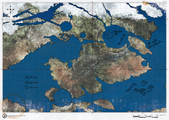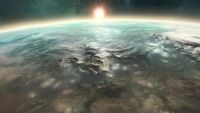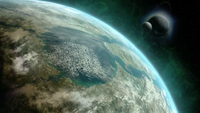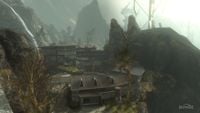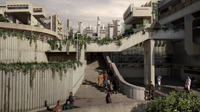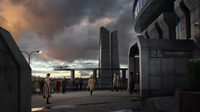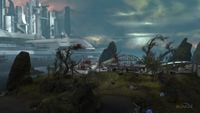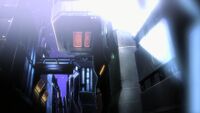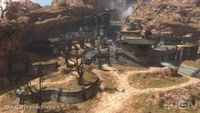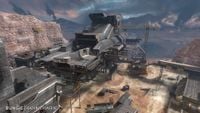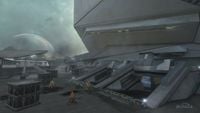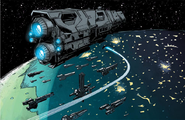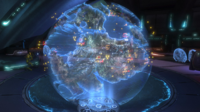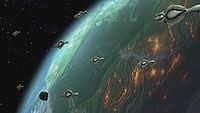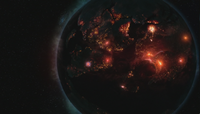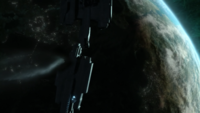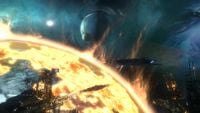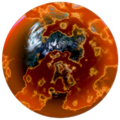Reach: Difference between revisions
From Halopedia, the Halo wiki
m (Revert: there's already a Gallery linkbox. If the current location is not ideal, move it up.) |
m (→Locations) |
||
| Line 81: | Line 81: | ||
{{clear}} | {{clear}} | ||
== Locations == | == Locations == | ||
{{Wide Image|Reachglobe.png|1800px| | {{Wide Image|Reachglobe.png|1800px|A geographical map of Reach.|300px|right}} | ||
<!-- {{col-begin}} | <!-- {{col-begin}} | ||
{{col-2}} --> | {{col-2}} --> | ||
| Line 136: | Line 136: | ||
<!-- {{col-end}} --> | <!-- {{col-end}} --> | ||
{{clear}} | {{clear}} | ||
== Gallery == | == Gallery == | ||
{{Linkbox|gallery=yes}} | {{Linkbox|gallery=yes}} | ||
Revision as of 11:51, June 5, 2013
- "...our fortress among the stars."
- — Dr. Catherine Halsey[1]
Reach is a human colony world in the Epsilon Eridani system, located within the Inner Colonies. At 10.5 light years from the Sol system, it is located at Earth's metaphorical doorstep. Reach is the fourth largest planet in the Epsilon Eridani system, and second closest to the star Epsilon Eridani.[2]
Once home to a Forerunner presence, Reach held considerable importance to the United Nations Space Command as the nexus of its military and the site of many military-industrial facilities such as shipyards. It was also significant for being one of the largest producers of titanium, which is plentiful on the planet. Though most commonly recognized for its status as a military world, Reach also had a sizable civilian population, living in its preplanned cities or defying the planet's harsh nature in sturdy pioneer settlements.[2]
Reach became the target of a Covenant invasion in 2552. Although the planet was defended by the UNSC for several weeks, Reach eventually fell to the Covenant, resulting in the planet's glassing in one of the most decisive defeats suffered by humanity over the course of the Human-Covenant War and the demise of the majority of its population.
Overview
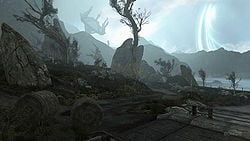
For a young planet with an age of less than one billion years, compared to Earth's 4.6 billion year existence, Reach is remarkably geologically stable.[2] Reach is larger than Earth, having a diameter of 15,273 kilometers, compared to the 12,756 kilometers diameter of Earth.[3] Reach was originally inhospitable for human life, requiring some degree of terraforming before it could be colonized. Mostly a rugged and harsh wilderness filled with towering mountains, deserts and weather-beaten forests, Reach's surface is pockmarked with meteor impact craters, some of these forming large seas.[4] Reach has a strong aurora phenomenon, to the extent the planet is covered in an "aura" of aurorae. This may be caused by a stronger magnetic field.[5] Reach has two natural satellites; the large, ringed Csodaszarvas and the small, cratered Turul which was captured into Reach's orbit as recently as some 70-80 thousand years ago.[6] Reach's oceans also experience strong tidal phenomena.[7]
Many of Reach's original settlers hailed from Eastern Europe, particularly Hungary, which is reflected in some of the place names on the planet. Many of the planet's inhabitants also spoke Hungarian as their first language.[8] Despite Reach's harsh nature, some settlers chose to live in small communities of homesteads, referred to as "kivas",[9] in the wilderness instead of the major cities. Rounded and enclosed, they were comfortable but practical, shuttered against Reach's forceful climate and bunkered into hillsides. It also related their independent nature; powered by wind turbines and hydroelectric plants, they were off the grid and self-sustaining.[10][11]
Reach was the most important headquarters for the United Nations Space Command outside of Earth and the main supplier of military and civilian spacecraft, and the location of the UNSC's largest and most active shipyard. High Command, Fleet Command and the Marine Corps maintained headquarters on Reach, as well as many primary Naval Intelligence bases, which included the highly classified CASTLE Base. It was also where the UNSC's most elite troops, including the ODSTs as well as the SPARTAN-IIs, were trained. Reach's purpose was not solely military however; the surface of the planet also featured farmland and civilian towns and districts.[12] The largest cities on Reach were Manassas, Quezon, Ezhtergom and New Alexandria.[13] Reach had nine space elevators,[13] three of which were located near the city of New Alexandria.[14]
Reach was the largest non-automated exporter of titanium within the human colonies.[2] Deposits of the element could be found in abundance on the planet, sometimes breaking the surface in the form of large spires.[15]
Before the Covenant invasion, Epsilon Eridani's superior interstellar jump point had been the most active Slipstream space transfer zone (arrivals and departures) for over thirty years, with the system's inferior IJP and Sol's superior IJP regularly trading second and third place spots.[2]
History
The Forerunners
The Forerunners maintained a presence on Reach long before human colonization. They built at least two complices; one beneath Menachite Mountain, and another beneath the Babd Catha Ice Shelf. Both of these were later discovered by the UNSC.
UNSC powerhouse
The first planetary confirmations of Reach were made in the early 21st century.[2] Originally colonized during humanity's first wave of extrasolar colonization in 2362 by the Odyssey,[16] Reach was chosen to be the site of a colony due to its rich titanium deposits. This resulted in extensive mining activity, with titanium mines throughout Reach running thousands of meters deep. ONI's secret CASTLE Base was located in one of these mines underneath Menachite Mountain. The Office of Naval Intelligence commandeered the mine after it breached a secret complex beneath Reach's surface containing a Forerunner artifact that was highly desired by the Covenant. The fact that this artifact was so valuable to them is perhaps the main reason anyone survived the aftermath of the Fall of Reach at all, as the Covenant were afraid of destroying it. This facility was also the birthplace of the legendary SPARTAN-II Program.
The SPARTAN-IIs were trained and housed on Reach. Fred-104 said Reach was their home and every SPARTAN-II would fight to the death to defend it.[17] Reach may be more important to the Spartans than Earth, the homeworld of humanity.
Despite its position as the UNSC's largest naval base, strategic headquarters, and second-largest population center, the Epsilon Eridani system was wracked by Insurrectionist activity throughout the early 26th century. Reach's sister planet, Tribute, was one of the fronts for the UNSC's anti-terrorist campaign, Operation: TREBUCHET. In 2525, mere months before the outbreak of the Human-Covenant War, Reach was the site of a major terrorist bombing against the luxury liner National Holiday. Two orbital taxis filled with explosives were crashed into the liner, causing the liner to plummet into the atmosphere, incinerating everyone on board.[18]
The Fall of Reach
- Main article: Fall of Reach
Reach fell to the Covenant during the Human-Covenant War in 2552. An advance strike force first arrived at the planet in late July, taking out a major communications outpost and attacking several UNSC facilities over a span of several weeks. A significantly larger Covenant fleet arrived on August 14 and began to lay siege on several cities on the planet. The final battle for the planet was fought when a massive Covenant invasion fleet over 300 ships strong arrived in the morning of August 30.[13]
The final attack halted Operation: RED FLAG, a plan devised by the UNSC to bring an end to the war, as the UNSC Pillar of Autumn, which was already on its way to the mission, was recalled to Reach to defend the planet against the massive Covenant attack. The majority of the SPARTAN-IIs aboard the ship were dispatched to the planet's surface to protect the generators for the orbital defense platforms while a small team led by John-117 boarded Reach Station Gamma to secure an unprotected NAV database aboard the ONI prowler Circumference. Eventually, the Autumn was one of the few ships to escape the battle.
The battle was a disaster for the numerically-inferior UNSC fleet, despite the orbital defense platforms. The Covenant glassed most of Reach with plasma bombardment. CASTLE base was destroyed after the planet's fall and the Covenant began searching for a Forerunner crystal. The remaining UNSC forces finally abandoned the planet during a small raid a few days later.
Revival and re-terraforming effort
By 2589, Reach had been terraformed and restored to a habitable state, and new human colonists were re-settling the planet.[19]
Defenses
While Earth was rightly seen as the UNSC's commercial, political, and cultural center; Reach was undeniably the hub of its military power. The Epsilon Eridani Fleet was a full strength carrier group with the supercarrier UNSC Trafalgar at its core.[2]
A semi-mobile array of twenty orbital defense platforms (ODP), equipped with heavy MAC guns also known as "big sticks," orbit around Reach, some of which were in place as early as 2527. The "big sticks" were defended by multiple wings of single ships and tactical multi-role craft. In addition, there were also about 100 to 150 warships stationed in the Epsilon Eridani system at any time. Reach also had a network of 18 refit stations orbiting it.[20] The ODPs were destroyed during the invasion of Reach, or were disabled by ground troops by destroying their power source. Despite their huge numbers, the fleet of warships was destroyed by a massive combined Covenant fleet.
- Total available military manpower: 385,421,100
- Total land assets: 58,430
- Total naval assets: 1,209 (T); 75 (X)
- Total air assets: 11,050
- Serviceable airports: 1,246
- Defense budget: cR. 38,287,000,000 [as of 2548][2]
Locations
Ground locations
- ODG Facility A-412
- Pálháza
- Quezon
- Csongrád
- Viery Territory[note 1]
Orbital locations
- Anchor 9
- Casimir Station
- ONI Medical Facility
- Reach Station Gamma
- Orbital defense platforms
- Reach orbital shipyards
Gallery

|
Browse more images in this article's gallery page. |
A comparison of Earth's size to Reach's.[3]
A map showing the Viery Territory of Reach.
A view of Reach with Turul and Csodaszarvas, the two natural satellites of Reach.
- HaloReach - Flora.jpg
Flora on Reach.
A typical kiva on Reach.
The city of New Alexandria on Reach.
Daisy-023 in a city on Reach.
A hydroelectric plant on Reach.
A ship breaking yard on Reach.
Sword Base on Reach.
A hologram of Reach in a Covenant corvette's holotank.
A destroyed UNSC frigate over Reach during the Fall.
List of appearances
- Halo: Combat Evolved (Mentioned only)
- Halo 2
- Halo 3: ODST (Mentioned only)
- Halo: Reach
- Halo: The Fall of Reach (First appearance)
- Halo: First Strike
- Halo: Ghosts of Onyx (Mentioned only)
- Halo: Contact Harvest (Mentioned only)
- Halo: The Cole Protocol
- Halo: Evolutions - Essential Tales of the Halo Universe
- Pariah
- Dirt (Mentioned only)
- The Return (Mentioned only)
- Halo Wars: Genesis (Mentioned only)
- Halo Legends
- Halo: Fall of Reach
- Halo 4: Forward Unto Dawn (Mentioned only)
Notes
- ^ The planetary map of Reach that comes with the Limited and Legendary Editions has "CAS" marked in the central mountain range of the Viery Territory. Judging by how Sword Base's location is marked by a similar callout, "SWO", this places the Highland Mountains, CASTLE Base, and all nearby locations in the Viery Territory.
Sources
- ^ Halo: Reach ViDoc: A Spartan Will Rise
- ^ a b c d e f g h Cite error: Invalid
<ref>tag; no text was provided for refs namedbnet - ^ a b Twitpic: Earth and Reach comparison
- ^ GameInformer: February 2010
- ^ Halo: Reach level Long Night of Solace
- ^ halo.bungie.org: I've got your answer, Levi...
- ^ Halo: Reach, Limited Edition bonus content, map of Reach
- ^ Halo: Reach level Winter Contingency
- ^ Halo: Reach, Legendary Edition Developer Commentary
- ^ EDGE Magazine, February 2010
- ^ Halo: Reach level Powerhouse
- ^ Halo: Evolutions - Essential Tales of the Halo Universe, page 52
- ^ a b c Cite error: Invalid
<ref>tag; no text was provided for refs namedvis - ^ Halo: Reach, campaign level New Alexandria
- ^ Halo: Reach, firefight map Unearthed
- ^ Halo Encyclopedia, page 43 (2011 edition)
- ^ Halo: First Strike, page ??
- ^ Halo: Contact Harvest, page 127
- ^ Halo: Reach, campaign level Lone Wolf
- ^ Bungie.net: Noble Map Pack Quick Looks
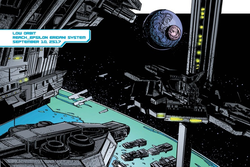
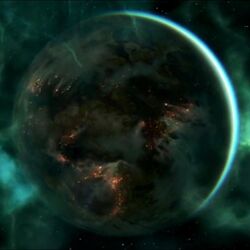
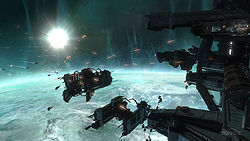
![A comparison of Earth's size to Reach's.[3]](https://halo.wiki.gallery/images/thumb/f/fa/Reachtoearth.jpg/160px-Reachtoearth.jpg)
